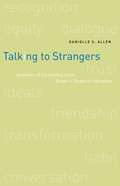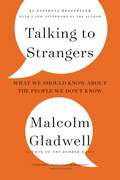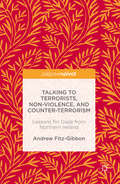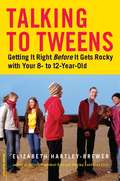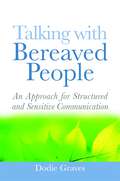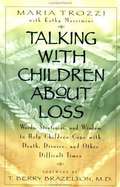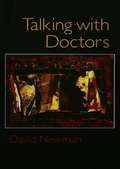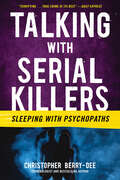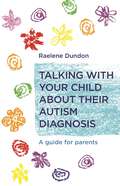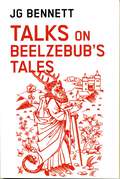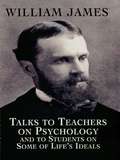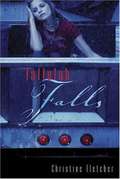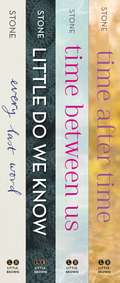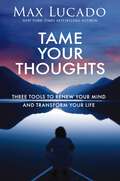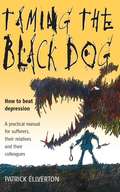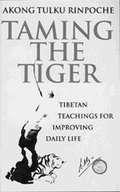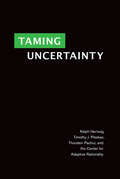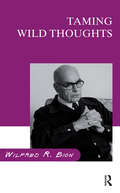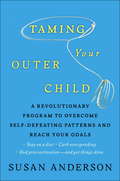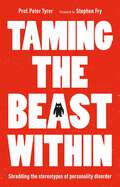- Table View
- List View
Talking to Strangers: Anxieties of Citizenship since Brown v. Board of Education
by Danielle S. Allen"Don't talk to strangers" is the advice long given to children by parents of all classes and races. Today it has blossomed into a fundamental precept of civic education, reflecting interracial distrust, personal and political alienation, and a profound suspicion of others. In this powerful and eloquent essay, Danielle Allen, a 2002 MacArthur Fellow, takes this maxim back to Little Rock, rooting out the seeds of distrust to replace them with "a citizenship of political friendship. "Returning to the landmark Brown v. Board of Education decision of 1954 and to the famous photograph of Elizabeth Eckford, one of the Little Rock Nine, being cursed by fellow "citizen" Hazel Bryan, Allen argues that we have yet to complete the transition to political friendship that this moment offered. By combining brief readings of philosophers and political theorists with personal reflections on race politics in Chicago, Allen proposes strikingly practical techniques of citizenship. These tools of political friendship, Allen contends, can help us become more trustworthy to others and overcome the fossilized distrust among us. Sacrifice is the key concept that bridges citizenship and trust, according to Allen. She uncovers the ordinary, daily sacrifices citizens make to keep democracy working and offers methods for recognizing and reciprocating those sacrifices. Trenchant, incisive, and ultimately hopeful, Talking to Strangers is nothing less than a manifesto for a revitalized democratic citizenry.
Talking to Strangers: What We Should Know about the People We Don't Know
by Malcolm GladwellMalcolm Gladwell, host of the podcast Revisionist History and author of the #1 New York Times bestseller Outliers, offers a powerful examination of our interactions with strangers--and why they often go wrong. <P><P>How did Fidel Castro fool the CIA for a generation? Why did Neville Chamberlain think he could trust Adolf Hitler? Why are campus sexual assaults on the rise? Do television sitcoms teach us something about the way we relate to each other that isn't true? <P><P>Talking to Strangers is a classically Gladwellian intellectual adventure, a challenging and controversial excursion through history, psychology, and scandals taken straight from the news. He revisits the deceptions of Bernie Madoff, the trial of Amanda Knox, the suicide of Sylvia Plath, the Jerry Sandusky pedophilia scandal at Penn State University, and the death of Sandra Bland---throwing our understanding of these and other stories into doubt. <P><P>Something is very wrong, Gladwell argues, with the tools and strategies we use to make sense of people we don't know. And because we don't know how to talk to strangers, we are inviting conflict and misunderstanding in ways that have a profound effect on our lives and our world. In his first book since his #1 bestseller, David and Goliath, Malcolm Gladwell has written a gripping guidebook for troubled times. <P><P><b>A New York Times Bestseller</b>
Talking to Terrorists, Non-Violence, and Counter-Terrorism
by Andrew Fitz-GibbonThis book examines the history of "the Troubles" in Northern Ireland in the 1970s-1990s and compares it with the situation in the Gaza Strip. The book takes as its cue the tragic events in Gaza in July 2014, when Israel launched Operation Protective Edge which began seven weeks of bombardment of Gaza and which led to rocket attacks by the Palestinians on Israel. In all over 2,200 people were killed. The book provides a brief history of the violence in both countries. It then analyzes the Northern Ireland Peace Process that resulted in the Good Friday Agreement in 1998, which ended decades of violence and led to relative peace in Northern Ireland through the process of "talking to terrorists. " The book suggests seven creative lessons for a peaceful way forward between the Israelis and the Palestinians.
Talking to Tweens: Getting It Right Before It Gets Rocky with Your 8- to 12-Year-Old
by Elizabeth Hartley-BrewerThey may look sweet and compliant, but these days children aged between 8 and 12-"tweens” -are fast emerging as a force to be reckoned with. Gaining in confidence, expecting more freedom, and increasingly targeted commercially, they present many new and challenging issues for parents. But getting the relationship right during these important years can build a rewarding trust and openness that will see parents through the rocky teenage years ahead. Giving sound advice that is firmly rooted in the real world and based on a clear understanding of tweens’ needs, parenting expert Elizabeth Hartley-Brewer explains how staying close to our children while beginning to let go helps us achieve the balance that is so important for the parent-child relationship. Tackling everyday issues of real concern,Talking to Tweensoffers practical, down-to-earth, and reassuring guidance on: Self-discipline, consideration, and kindnessPeer pressure and bullyingAllowances and spending moneyBody image and healthy eatingSex and pubertyFamily disruptionsRisk, danger, and responsibilitySchool problems and work pressureNurturing self-esteem and identity
Talking with Angels of Wealth: Receive Their Blessings
by Amanda HartAmanda Hart was rescued by guardian angels as a child and from thence on they became a beacon of hope throughout her turbulent journey into womanhood. The illuminating conversations she has with her angels remain an important aspect of her everyday life, bringing her continual support and spiritual fulfillment. She now dedicates her life to helping others connect with their own angels, helping them to find deeper meaning and happiness in their lives.
Talking with Bereaved People
by Dodie GravesIt can be hard to know what to talk about with a bereaved person over a period of time once you have offered your condolences. This book shows how, by using good active listening skills, empathic exploration and a willingness to talk about the hard issues, you can embark on a process of sensitive conversation that helps the bereaved person to come to terms with their grief. Dodie Graves outlines a practical framework of six elements for conversing with bereaved people in a structured but flexible way that avoids prescriptive instructions. The elements include talking about the story of the deceased, their relationship with the person, celebrating their life, discussing their legacy, strategies for coping and thinking about the journey undertaken. She shows how to use the elements in conversations with individuals and groups, and for each element suggests creative activities and open questions that can be used, provides anecdotes and case vignettes, and gives a brief summary of the theory pertinent to each stage of the conversation. Talking with Bereaved People is an approachable tool for anyone working with bereaved people, including counsellors, voluntary bereavement agencies, church pastoral teams, hospice and hospital staff, trainers and social workers.
Talking with Children About Loss: Words, Strategies, and Wisdom to Help Children Cope with Death, Divorce, and Other Difficult Times
by Maria TrozziThrough captivating stories and thoughtful analysis, Maria Trozzi explains how to handle the difficult job of talking with children and adolescents about loss, with discussions about: * How children perceive and interpret events such as death, disability, and divorce * Guiding children through the four tasks of mourning * Helping children face funerals, wakes, and memorial services * Children's fears and fantasies: how they express them, and how to address them * Age-appropriate responses to children's questions and concerns * Talking to children about long-term illness, suicide, family or community tragedy, and other special situations * What to do when children won't talk about loss, and when to seek professional help
Talking with Doctors
by David NewmanWithout any warning, in September 1999, David Newman was told he had a rare and life-threatening tumor in the base of his skull. In the compressed space of five weeks, he consulted with leading physicians and surgeons at four major medical centers. The doctors offered drastically differing opinions; several pronounced the tumor inoperable and voiced skepticism about the effectiveness of any nonsurgical treatment. Talking with Doctors is the story of Newman's efforts, at a time of great stress and even impending death, to wend his way through the dense thicket of medical consultations in search of a physician and a treatment that offered the possibility of survival. It is the story, especially, of the harrowing process of assessing conflicting "expert" opinions and, in so doing, of making sense of the priorities, personalities, and vulnerabilities of different doctors. All too often, he found, the leading specialists to whom he was sent were strangers in the consulting room-and strangers who became stranger still, both cognitively and emotionally, when ambiguous findings pushed them to the outer limits of their training and experience. Newman writes poignantly of his sense of powerlessness and desperation, of the painstaking means by which he ascertained what could be known about his tumor, and of the fortuitous events that finally led him to life-saving help. Talking with Doctors is a compelling, absorbing, unsettling story that touches a collective raw nerve about the experience of doctors and medical care when life-threatening illness leads us to subspecialists at major medical centers. Probing the nature of medical authority and the grounds of a trusting doctor-patient relationship, Newman illuminates with grace and power what it now means for a patient to participate in life-and-death medical decisions.
Talking with Serial Killers: Sleeping with Psychopaths (Talking with Serial Killers)
by Christopher Berry-DeeExclusive, first-hand accounts of the men and women who have slept with infamous killers in a book praised as “terrifying . . . true crime at its best” (Daily Express).Bestselling true crime writer and criminologist Christopher Berry-Dee turns his attention to a new kind of victim: the wives and partners of serial murderers who remained unaware of exactly who they had fallen for until after their other half’s arrest or, in some cases, conviction. Only upon Peter’s arrest did Sonia Sutcliffe first discover that her husband was leading a secret existence as the Yorkshire Ripper. The wife of the Hillside Strangler only learned of her husband’s crimes when state police smashed down her door in search of him. When finding out the truth, these innocents have to face the grim reality of betrayal and deceit and often experience guilt for not having recognized the killer in their home. Christopher Berry-Dee speaks directly with killers and their oblivious loved ones to get inside the minds of the men and women who fall for murderers.
Talking with Your Child about Their Autism Diagnosis: A Guide for Parents
by Raelene DundonTelling your child about their autism diagnosis can be daunting. Will they be better off for knowing? What's the right way to tell them? Should you inform anyone else too? As a mother of two children on the spectrum, with over ten years' experience as a psychologist specialising in childhood autism, Raelene Dundon has all the tips you'll need. In this concise book, she sets out case studies, examples and resources that will equip you to make your own informed choices and help your whole family to live well with autism. Part One provides ways to tell children of different ages and development levels about their diagnosis, including photocopiable and downloadable worksheets designed to help diagnosed children understand autism, and gives advice on what to do if they react in a negative or unexpected way to the news. Part Two explores the pros and cons of sharing the diagnosis with others, including family, friends, school staff and your child's classmates, and guides you through what to do if others don't understand or accept the diagnosis.
Talks on Beelzebub's Tales
by John Godolphin BennettBennett first read Beelzebub's Tales in 1948. He regarded it as a work of superhuman genius, containing expressions of reality, which, by their very nature, were bound to make severe demands on any reader. With Gurdjieff's approval, he undertook a series of lectures in London focusing on the essential meaning of Beelzebub's Tales. More than commentaries, these "talks" are an invitation into the deeper meanings of Gurdjieff's enigmatic "tales.&” This book was compiled and arranged soon after the last years of Bennett's life by Anthony Blake. Now, thirty-years after that initial compilation, Blake gives us a new foreword with contemporary insights into the visionary message of Gurdjieff's &“tales to his grandson.&” Although Bennett's talks were intended to be a companion to reading and understanding Gurdjieff's masterwork, Anthony Blake's foreword allows even those unfamiliar with Gurdjieff's Tales to begin a journey into the depth of its meaning.
Talks to Teachers on Psychology: and to Students on Some of Life's Ideals
by William JamesStill-vital lectures on teaching deal with psychology and the teaching art, the stream of consciousness, the child as a behaving organism, education and behavior, and more. The three addresses to students are "The Gospel of Relaxation," "On a Certain Blindness in Human Beings," and "What Makes a Life Significant?" Preface. 2 black-and-white illustrations.
Tallulah Falls
by Christine FletcherWhen Tallulah Addy sets out on an impulsive cross-country trip to rescue her best friend, she doesn't anticipate getting stranded in rural Tennessee without a dime. Nor does she guess that rescuing a dog will land her a job in the local veterinarian's office. But there, under the wary eye of ornery Dr. Poteet, Tallulah works harder than ever before, tending to animals of all shapes and sizes--and unexpectedly, to wounds long-buried in herself. Tallulah swears she'll leave the first chance she gets, yet when given the choice, it may prove harder to keep the promise to her friend than to say good-bye to the strangers who have become her new family.
Tamara Ireland Stone Collection
by Tamara Ireland StoneDiscover four critically-acclaimed novels from award-winning author Tamara Ireland Stone, including the New York Times bestseller Every Last Word.In the New York Times bestselling Every Last Word, Samantha McAllister looks just like the rest of the popular girls in her junior class. But she&’s hiding a secret that her friends would never understand: Sam has Purely-Obsessional OCD and is consumed by a stream of dark thoughts and worries that she can't turn off. It doesn't help that her lifelong friends will turn toxic at the first sign of a wrong outfit, wrong lunch, or wrong crush. So when Sam meets Caroline, she has to keep her new friend a secret, right up there with Sam's weekly visits to her psychiatrist. But then Caroline introduces Sam to Poet's Corner, a tight-knit group of misfits who have been ignored by the school at large. Sam is drawn to them immediately, especially a guitar-playing guy with a talent for verse. Slowly, she begins to feel more "normal" than she ever has as part of the popular crowd . . . until she finds a new reason to question her sanity and all she holds dear.In Little Do We Know, lifelong best friends and next-door neighbors Hannah and Emory have never gone a single day without talking. But now it&’s senior year and they haven't spoken in three months. Not since the fight, where they each said things they couldn't take back. Then one fateful night, Emory's boyfriend, Luke, almost dies, and Hannah is the one who finds him and saves his life. As Luke tries to make sense of his experience, he secretly turns to Hannah, who becomes his biggest confidante. And in Luke, Hannah finds someone she can finally talk to. But Emory just wants everything to go back to normal—the way it was before the accident. But when the horrifying reason behind Hannah and Emory's argument ultimately comes to light, all three of them will be forced work together to protect the one with the biggest secret of all in this deeply moving, unforgettable story about love, betrayal, and the power of friendship.In Time Between Us, Anna and Bennett were never supposed to meet. She lives in 1995 Chicago and he lives in 2012 San Francisco. But Bennett's unique ability to travel through time and space brings him into Anna's life, and with him, a new world of adventure and possibility. As their relationship deepens, they face the reality that time might knock Bennett back where he belongs, even as a devastating crisis throws everything they believe into question. Against a ticking clock, Anna and Bennett are forced to ask themselves how far they can push the bounds of fate—and what consequences they can bear in order to stay together.In the sequel to Time Between Us, Time After Time, Anna and Bennett have found a way to stay together against all odds. It&’s not a perfect arrangement, though, with Bennett unable to stay in the past for more than brief visits, skipping out on big chunks of his present in order to be with Anna. They each are confident that they&’ll find a way to make things work…until Bennett witnesses a single event he never should have seen. Will the decisions he makes from that point on cement a future he doesn&’t want?
Tame Your Thoughts: Three Tools to Renew Your Mind and Transform Your Life
by Max LucadoWhen was the last time you awakened to a swirl of out-of-control thoughts? Perhaps you were overwhelmed with the weight of worry, the fear of failing, or the grip of guilt. The way we think directly impacts our joy and peace. In Tame Your Thoughts, Max Lucado provides three biblical and practical tools to renew your mind and transform your life.Our thoughts have consequences. Most people would agree that positive thoughts generate positive actions. Negative thoughts activate negative behavior. But do we understand that we can manage our lives by managing our thoughts? Not only does neuroscience back this concept, but the idea is also embedded throughout Scripture. "Do not be conformed to this world but be transformed by the renewal of your mind" (Rom.12:2 esv). Tame your thoughts and transform your life!In Tame Your Thoughts, Max explores three key thought-management tools and then applies them to the most common thought problems: worry, guilt, anxiety, and other types of mental quicksand that threaten to trap us. God loves us too much to let us lead a life marked by poor thinking. He made our brains; he can retrain our brains. God has not left us alone in this battle of the mind. Stuck in your head? Hounded by regrets? Weighed down by worry? Change is possible! The thoughts that have characterized your past need not characterize the rest of your life. Readers will learn totake thoughts captive,test each message against the truth of Scripture,interrupt poisonous thought threads, andthink and act like Jesus. If God can resurrect the dead, can he not resurrect hope? Defy depression? Clarify confusion? Silence shame? Destroy doubt? Banish bitterness?Take God at his word. "For God has not given us a spirit of fear, but of power and of love and of a sound mind" (2 Tim. 1:7 nkjv, emphasis added). With God as their helper, the reader will discover a new way of thinking and a better way of living. A new person will begin to emerge.We can tame each thought, friends.
Taming Tension
by W. Phillip KellerWith his usual compassionate and conversational style, Keller talks about tension: its causes, its affects, and what we can do about it. His advice is practical, well-researched, and always based on Biblical principles. An excellent book for anyone who is (or expects to be) feeling stress-out.
Taming The Black Dog: How To Beat Depression. A Practical Manual For Sufferers, Their Relatives And Their Colleagues
by Patrick EllvertonThis self help manual is for those for whom depression arises from the impact of exceptional circumstances such as childbirth and menopause, commercial and professional failure, accident, grief, divorce or debt as well as for those more permanent owners of the Black Dog.Contents: 1. Preface; 2. Your first step; 3. Medication; 4. Causes; 5. Manage your life; 6. Repulsing attacks; 7. Habits for repairing damage; 8. Utilising your subconscious computer; 9. Praying; 10. Vitality; 11. Sleeping; 12. Healthy eating; 13. Alcohol; 14. Fitness
Taming The Black Dog: How to Beat Depression - A Practical Manual for Sufferers, Their Relatives and Colleagues
by Patrick EllvertonThis self help manual is for those for whom depression arises from the impact of exceptional circumstances such as childbirth and menopause, commercial and professional failure, accident, grief, divorce or debt as well as for those more permanent owners of the Black Dog.Contents: 1. Preface; 2. Your first step; 3. Medication; 4. Causes; 5. Manage your life; 6. Repulsing attacks; 7. Habits for repairing damage; 8. Utilising your subconscious computer; 9. Praying; 10. Vitality; 11. Sleeping; 12. Healthy eating; 13. Alcohol; 14. Fitness
Taming The Tiger: Tibetan Teachings For Improving Daily Life
by Akong Tulku RinpocheTAMING THE TIGER offers a simple approach to finding happiness for oneself that also brings happiness to others. Based on twenty years of Buddhist teaching in the West, Taming the Tiger aims to help anyone seeking the truth about suffering and happiness. The first part of the book deals with topics such as Impermanence, The Right Motivation, Facing the Situation, Body, Speech and Mind, Compassion, and Mindfulness. The second part is devoted to exercises, meditations and relaxation techniques for body and mind, including Feeling, Openness, Taking Suffering, Bringing the Buddha to Life and Universal Compassion. The exercises, designed to provide a base of self-knowledge, mind-therapy and self-healing have also been found beneficial in therapy workshops and in the treatment of psychological problems.This practical programme has been tested and refined first at therapy workshops of Samye Ling in Scotland - the oldest Tibetan Buddhist centre in the West - and has since confirmed its success in cities throughout Europe, North America and Africa, bringing definitive solutions to long-term problems weighing heavily on the mind.
Taming Uncertainty
by Ralph Hertwig Timothy J. Pleskac Thorsten PachurAn examination of the cognitive tools that the mind uses to grapple with uncertainty in the real world. How do humans navigate uncertainty, continuously making near-effortless decisions and predictions even under conditions of imperfect knowledge, high complexity, and extreme time pressure? Taming Uncertainty argues that the human mind has developed tools to grapple with uncertainty. Unlike much previous scholarship in psychology and economics, this approach is rooted in what is known about what real minds can do. Rather than reducing the human response to uncertainty to an act of juggling probabilities, the authors propose that the human cognitive system has specific tools for dealing with different forms of uncertainty. They identify three types of tools: simple heuristics, tools for information search, and tools for harnessing the wisdom of others. This set of strategies for making predictions, inferences, and decisions constitute the mind's adaptive toolbox. The authors show how these three dimensions of human decision making are integrated and they argue that the toolbox, its cognitive foundation, and the environment are in constant flux and subject to developmental change. They demonstrate that each cognitive tool can be analyzed through the concept of ecological rationality—that is, the fit between specific tools and specific environments. Chapters deal with such specific instances of decision making as food choice architecture, intertemporal choice, financial uncertainty, pedestrian navigation, and adolescent behavior.
Taming Wild Thoughts
by Wilfred R. BionTaming Wild Thoughts brings together previously unpublished works from two different periods of the author's life which are linked, as the author says in her introduction, by the concept of classifying and conceptualizing thought. The first paper, "The Grid", dates from 1963 and is a discussion of great clarity about one of the author's most widely-used conceptual tools; it predates his more discursive paper of the same title (published in Two Papers) by several years. As a teaching paper on this topic, this version of "The Grid" is without parallel, and will doubtless be of great value to all students of his work. The second part of the book consists of transcripts of two tape-recordings made by Bion in 1977. They underline his interest in "wild" or "stray" thoughts; and they provide an insight into his extraordinary sensibility at the time of A Memoir of the Future.
Taming Your Outer Child
by Susan AndersonFINALLY, THE BREAKTHROUGH BOOK THAT PUTS YOU BACK IN CONTROL OF YOUR LIFE Most of us have met our Outer Child once too often. The self-sabotaging, bungling, and impulsive part of the personality. This misguided, hidden nemesis--the devil on your shoulder--blows your diet, overspends, and ruins your love life. A menacing older sibling to your emotionally needy Inner Child, your Outer Child acts out and fulfills your legitimate childlike needs and wants in the wrong place, at the wrong time, and in counterproductive ways: It goes for immediate gratification and the quick fix in spite of your best-laid plans. Food, attention, emotional release--your Outer Child usually gets what it wants, and your Adult self can feel powerless to stop it. Now, in a revolutionary rethinking of the link between emotion and behavior, veteran psychotherapist and theoretician Susan Anderson offers a three-step, paradigm-shifting program to tame your Outer Child's destructive behavior. This dynamic, transformational set of strategies--action steps that act like physical therapy for the brain--calms your Inner Child, strengthens your Adult Self and releases you from the self-blame and shame that are the root of Outer Child issues, and paves new neural pathways that can lead to more productive behavior. Discover* the common Outer Child personality types, including the Drama Queen; the Master of Disguise; My Way or No Way; and Love the Getting, not the Having * proven techniques to resolve underlying sources of self-sabotage * insights that will allow you to stop blaming your supposed "lack of willpower" for your problems * key strategies for healing the painful issues of your past * mental exercises that effectively deal with Outer Child challenges around food, procrastination, love, debt, depression, and more As your head, heart, and behavior come together and learn to help, not hurt, one another, your strong Adult Self, contented Inner child, and tamed Outer child will become a reality. The result is happiness and fulfillment, self-mastery, and self-love.From the Hardcover edition.
Taming the Beast Within: Shredding the Stereotypes of Personality Disorder
by Peter TyrerForeword by Stephen FryControversy and confusion surround personality disorder (PD). Long dismissed as impossible to treat, PD has become a catch-all for various conditions, abounding with negative stereotypes and incorrect information. Now, revised and simpler classifications devised for the World Health Organization (WHO) should make diagnosis and treatment more straightforward. This book, by Professor Peter Tyrer, chair of the advisory body for the WHO, presents new ways of looking at personality. Taming the Beast Within explores the strengths as well as the difficulties of personality, so that all can come to an informed and tolerant understanding of PD. Topics include:what personality is`normal? and `abnormal? personalitieshow mental illness differs from personality disorderpolitics and personalitythe roots of disturbancetypes of disorder, including borderline personality disorderhelping yourself and othersnidotherapy and other approaches drug treatmentsProfessor Peter Tyrer says, `I hope this book will help people with PD, their families and friends, and everyone involved in managing this very common condition. Using our personality strengths, and accepting that some difficulties with others may be self-generated, are the key to understanding. The title of this book can then be changed ? no longer a beast within, just a pussy cat!?
Taming the Beast Within: Shredding the Stereotypes of Personality Disorder
by Peter TyrerForeword by Stephen FryControversy and confusion surround personality disorder (PD). Long dismissed as impossible to treat, PD has become a catch-all for various conditions, abounding with negative stereotypes and incorrect information. Now, revised and simpler classifications devised for the World Health Organization (WHO) should make diagnosis and treatment more straightforward. This book, by Professor Peter Tyrer, chair of the advisory body for the WHO, presents new ways of looking at personality. Taming the Beast Within explores the strengths as well as the difficulties of personality, so that all can come to an informed and tolerant understanding of PD. Topics include:what personality is‘normal’ and ‘abnormal’ personalitieshow mental illness differs from personality disorderpolitics and personalitythe roots of disturbancetypes of disorder, including borderline personality disorderhelping yourself and othersnidotherapy and other approaches drug treatmentsProfessor Peter Tyrer says, ‘I hope this book will help people with PD, their families and friends, and everyone involved in managing this very common condition. Using our personality strengths, and accepting that some difficulties with others may be self-generated, are the key to understanding. The title of this book can then be changed – no longer a beast within, just a pussy cat!’
Taming the Beast Within: Shredding the Stereotypes of Personality Disorder
by Peter TyrerForeword by Stephen FryControversy and confusion surround personality disorder (PD). Long dismissed as impossible to treat, PD has become a catch-all for various conditions, abounding with negative stereotypes and incorrect information. Now, revised and simpler classifications devised for the World Health Organization (WHO) should make diagnosis and treatment more straightforward. This book, by Professor Peter Tyrer, chair of the advisory body for the WHO, presents new ways of looking at personality. Taming the Beast Within explores the strengths as well as the difficulties of personality, so that all can come to an informed and tolerant understanding of PD. Topics include:what personality is‘normal’ and ‘abnormal’ personalitieshow mental illness differs from personality disorderpolitics and personalitythe roots of disturbancetypes of disorder, including borderline personality disorderhelping yourself and othersnidotherapy and other approaches drug treatmentsProfessor Peter Tyrer says, ‘I hope this book will help people with PD, their families and friends, and everyone involved in managing this very common condition. Using our personality strengths, and accepting that some difficulties with others may be self-generated, are the key to understanding. The title of this book can then be changed – no longer a beast within, just a pussy cat!’
